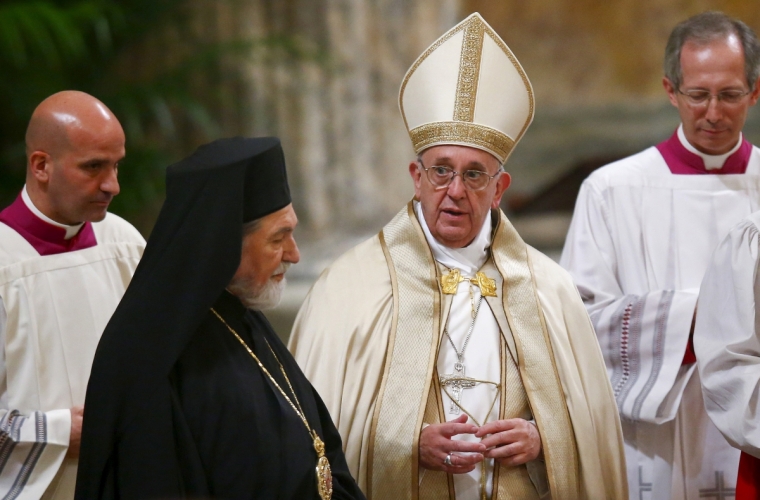In search for unity, Pope apologizes for Catholic Church's treatment of other Christians

ROME (Christian Examiner) – Since 1964, the Catholic Church has recognized Christians of other denominations as "separated brethren" who might still enjoy salvation through the mother church in Rome – a conclusion only reached after four centuries of contentious relations and warfare between Catholics and Protestants in Europe and a millennium-long rift with the Eastern Orthodox Church.
Now, Pope Francis is seeking "mercy and forgiveness" for the way the Catholic Church has treated those religious dissenters.
During a homily Monday in the Papal Basilica of St. Paul Outside the Walls, Francis said "there cannot be an authentic search for Christian unity without trusting fully in the Father's mercy. We ask first of all for forgiveness for the sins of our divisions, which are an open wound in the Body of Christ."
"As bishop of Rome and pastor of the Catholic Church, I want to ask for mercy and forgiveness for the behavior of Catholics towards Christians of other churches which has not reflected gospel values. At the same time, I invite all Catholic brothers and sisters to forgive if they, today or in the past, have been offended by other Christians. We cannot cancel out what has happened, but we do not want to let the weight of past faults continue to contaminate our relationships. God's mercy will renew our relationships," Francis said.
The pontiff's remarks came at the conclusion of a weeklong emphasis on praying for Christian unity and as part of the Jubilee year in which the church is focusing on the theme of mercy. At the beginning of the evening prayers, Pope Francis invited other religious leaders, including Orthodox Ecumenical Patriarch Metropolitan Gennadios and Anglican Archbishop David Moxon, to join him in the final blessing.
The church leaders had walked through the basilica door together, Pope Francis said, to remind them "the only door which leads to salvation is Jesus Christ our Lord, the merciful face of the Father."
Such ecumenical gestures are increasingly more common among Catholic leaders, but whether or not Rome can be fully reconciled with its "separated brethren" remains to be seen. There are long standing differences.
As bishop of Rome and pastor of the Catholic Church, I want to ask for mercy and forgiveness for the behavior of Catholics towards Christians of other churches which has not reflected gospel values. At the same time, I invite all Catholic brothers and sisters to forgive if they, today or in the past, have been offended by other Christians. We cannot cancel out what has happened, but we do not want to let the weight of past faults continue to contaminate our relationships. God's mercy will renew our relationships.
The eastern half of the Christian church broke with Rome in 1054 over issues surrounding liturgy, language, and theology (namely about how the Spirit of God comes to man). The Anglican Church broke in 1534 during the reign of Henry the VIII over his divorce from Catherine of Aragon and, while the English Church returned to Rome under the reign of "Bloody Mary" from 1553-58, after the ascension of Elizabeth I in 1559 it forever became Protestant in theology.
"While we journey together toward full communion," said Pope Francis, "we can begin already to develop many forms of cooperation in order to favor the spread of the Gospel – and walking together, we become aware that we are already united in the name of the Lord."
Pope Francis began his homily by referencing 1 Corinthians 15:9-10, in which the Apostle Paul acknowledged that his past persecution of the church made him suspect to many. God used the circumstances, he said, to illumine the faith.
"'I am the least of the Apostles ... because I persecuted the Church of God. But by the grace of God I am what I am, and His grace in me was not without effect.' That's how the Apostle Paul sums up the significance of his conversion," Francis said.
"Beyond the differences which still separate us, we recognize with joy that at the origin of our Christian life there is always a call from God Himself. We can make progress on the path to full visible communion between us Christians not only when we come closer to each other, but above all as we convert ourselves to the Lord, who through His grace, chooses and calls us to be His disciples. And converting ourselves means letting the Lord live and work in us. For this reason, when Christians of different Churches listen to the Word of God together and seek to put it into practice, they make important steps towards unity. It is not only the call which unites us, but we also share the same mission to proclaim to all the marvelous works of God," the pontiff said.